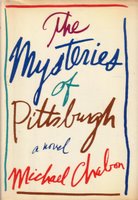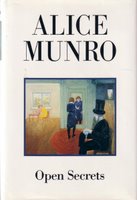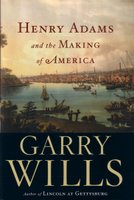 81. Forgetfulness, Ward Just. Fiction , 9-9, p. 258
81. Forgetfulness, Ward Just. Fiction , 9-9, p. 258How to describe the novels of Ward Just? Think of LeCarre, Furst and Greene, but there is also something here of Pete Dexter and Edith Wharton. Just writes of the manners and mores of the covert world of espionage. There is a certain way things are done, a protocol, as is unveiled in the French interrogation scene in this novel – in its violence, both tangible and latent, it is almost difficult to read.
Just deserves a broad and enthusiastic audience of readers. He is one of
 82. The Mysteries of
82. The Mysteries of Boy meets boy. Boy meets girl. Boy falls in love with girl. Boy falls in love with boy. Boy is confused.
The Mysteries of Pittsburgh, Michael Chabon’s first novel, is the story of a young man confused about his sexual identity. One assumes it is Chabon’s own effort at working out his sexual identify, although a reader must be careful about assigning such autobiographical leanings to a novelist’s work.
There are many, many books to read. In How to Read a Novel, John Sutherland says that today more novels are published in one week than Samuel Johnson had to deal with in a decade. As he calculates it, “it would take approximately 163 lifetimes to read the fiction currently available.” Given Sutherland’s sobering statistic give this book a pass and move directing to Chabon’s later works.
 83. Open Secrets, Alice Munro. Short Stories, 9-19, p. 294
83. Open Secrets, Alice Munro. Short Stories, 9-19, p. 294 Alice Munro is the best writer of short stories today. Not one of the best – the best. I have read many of these stories before. I suspect I will read them again and again. Many current novelists would be well served to closely read Munro. She can capture a world in a phrase, a sentence, a paragraph that would take others pages.
 84. Henry Adams and the Making of
84. Henry Adams and the Making of This book is not for the casual reader of history, but it will greatly reward the diligent student of history. It is a fascinating look at the legacy of Jefferson and Madison as seen through Henry Adams’ ambitious multi-volume history of


No comments:
Post a Comment